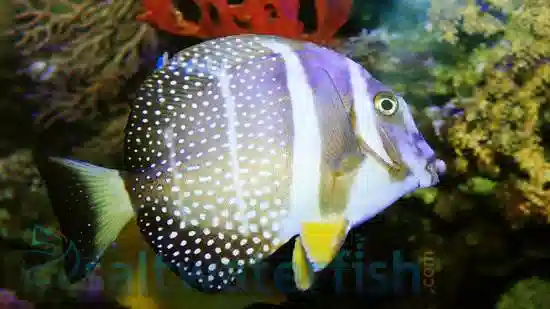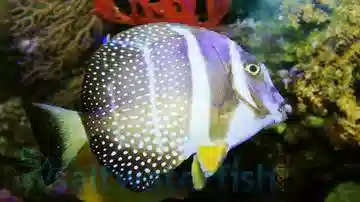Mustard Tang
Acanthurus guttatus
(0 Reviews)

Mustard Tang
Acanthurus guttatus
(0 Reviews)
{{ item.name }}
Size: {{ item.extra_field_3 }}
${{ getFormattedPrice(item.saleprice) }} ${{ getFormattedPrice(item.price) }}
To join the waiting list, click here
Free Shipping
With
$199.00
or more in Marine Life.
More details...
Mustard Tang Care Facts
| Care Level: | Easy |
|---|---|
| Temperament: | Peaceful |
| Diet: | Omnivore |
| Reef Safe: | Yes |
| Minimum Tank Size: | 250 gallons |
| Max Size: | 12 inches |
The Mustard Tang, Acanthurus guttatus, also known as the Mustard Guttatus Tang, the White spotted Surgeonfish, has a black body with a white face and white vertical bands along with many white dots scattered across its rear, with a black tail and yellow pelvic fins. The general body shape of the Mustard Tang resembles that of a Sailfin Tang. Mustard Tangs are best kept in large reef tanks, away from members of its own species, or other tangs. There should be ample amounts of rock work for the Mustard Tang to hide, plenty of free space for it to swim, and enough areas for it to graze on algae. The Mustard Tang will eat an omnivorous diet but should be explicitly fed marine algae or seaweeds to keep its temperament and stress levels down. Overall, the Mustard Tang is a stunning surgeonfish that is compatible with most large reef tanks.
Mustard Tang (Acanthurus guttatus): A Practical Care Guide
The Mustard Tang, scientifically known as Acanthurus guttatus, is a captivating marine species that can be valuable to your saltwater aquarium. This comprehensive guide will provide essential information on caring for this intriguing fish, covering its habitat, compatibility, diet, care requirements, and more.
Habitat of the Mustard Tang
Mustard Tangs are native to the warm waters of the Indo-Pacific, particularly around coral reefs and rocky shorelines. They inhabit depths ranging from 3 to 100 feet (1 to 30 meters), where they find shelter in crevices and rocky structures. These fish are accustomed to areas with moderate water flow, mimicking the surge zones along reef environments.
Reef Compatibility of the Mustard Tang
The Mustard Tang is generally considered reef-safe. These herbivorous fish predominantly feed on algae, particularly filamentous and microalgae. In captivity, they can help control algae growth on live rock and substrate, contributing to the overall cleanliness of the tank.
Size and Lifespan of the Mustard Tang
Fully grown Mustard Tangs typically reach lengths of about 6 to 8 inches (15 to 20 cm). They can live 5 to 10 years in captivity with proper care, offering several years of enjoyment for dedicated aquarists.
Diet in Captivity of the Mustard Tang
In their natural habitat, Mustard Tangs feed on various types of algae and detritus. In an aquarium setting, it's crucial to replicate their natural diet. Provide them with high-quality marine algae sheets, dried seaweed, and a mix of marine pellets and frozen foods such as brine shrimp and mysis shrimp. Providing a balanced diet is essential for their health and longevity.
Aquaculture and Availability of the Mustard Tang
Mustard Tangs are not commonly available through aquaculture. However, Saltwaterfish.com is committed to providing hobbyists with responsibly sourced fish, ensuring that each Mustard Tang is healthy, acclimated, and ready to thrive in your aquarium.
Compatibility with Other Fish and Invertebrates of the Mustard Tang
The Mustard Tang is generally peaceful and can coexist with many tank mates. They are less territorial compared to some other tang species. However, as with any fish, ensure your aquarium is large enough to accommodate their swimming needs and provide hiding spots to reduce potential territorial conflicts.
Sexual Dimorphism of the Mustard Tang
Sexual dimorphism in Mustard Tangs is minimal, and distinguishing between males and females based on visual characteristics is challenging.
Juvenile to Adult Coloration Changes of the Mustard Tang
Juvenile Mustard Tangs often display a bright yellow coloration, which deepens and develops unique patterns as they mature into adults. These patterns can include spots or lines, creating a visually appealing fish in the aquarium.
Temperament of the Mustard Tang
Mustard Tangs are known for their generally peaceful character. They are social fish and can thrive when kept with other peaceful tank mates. However, it's essential to provide them with sufficient space and hiding spots to reduce potential territorial conflicts.
Tank Requirements of the Mustard Tang
To provide the best care for your Mustard Tang, maintain a tank with a minimum size of 250 gallons (284 liters). Larger tanks are recommended for multiple tangs or when housing them with other tang species. Water conditions should mimic their natural habitat, with a pH level between 8.1 and 8.4, a salinity level of 1.020-1.025, a stable temperature between 74-78°F (23-26°C), and moderate water flow to simulate ocean currents.
Common Names of the Mustard Tang
The Mustard Tang is also known by various names, including Spotted Surgeonfish and Yellow-blotch Surgeonfish.
Compatible Tank Mates of the Mustard Tang
Here are five specific species that can make suitable tank mates for your Mustard Tang:
- Royal Gramma (Gramma loreto)
- Orchid Dottyback (Pseudochromis fridmani)
- Blue-Green Chromis (Chromis viridis)
- Yellowtail Damselfish (Chrysiptera parasema)
- Firefish Goby (Nemateleotris magnifica)
Why Choose the Mustard Tang from Saltwaterfish.com
When you acquire a Mustard Tang from Saltwaterfish.com, you invest in a captivating and adaptable addition to your saltwater marine aquarium. Saltwaterfish.com is dedicated to responsibly sourced fish, ensuring that each Mustard Tang is healthy, acclimated, and ready to thrive in your aquarium. With their commitment to quality and a wealth of resources, Saltwaterfish.com makes it easy to enjoy these tangs' unique beauty in your home aquarium.
The Mustard Tang (Acanthurus guttatus) offers a visually appealing and adaptable presence in saltwater marine aquariums. With their striking coloration and hardy nature, they can be a valuable choice for both beginner and experienced aquarists looking to add a touch of vibrancy to their collection. By adhering to their specific requirements and providing a suitable environment, aquarists can witness the Mustard Tang's unique presence in their aquatic habitat.
Currently Mustard Tang does not have any reviews.








